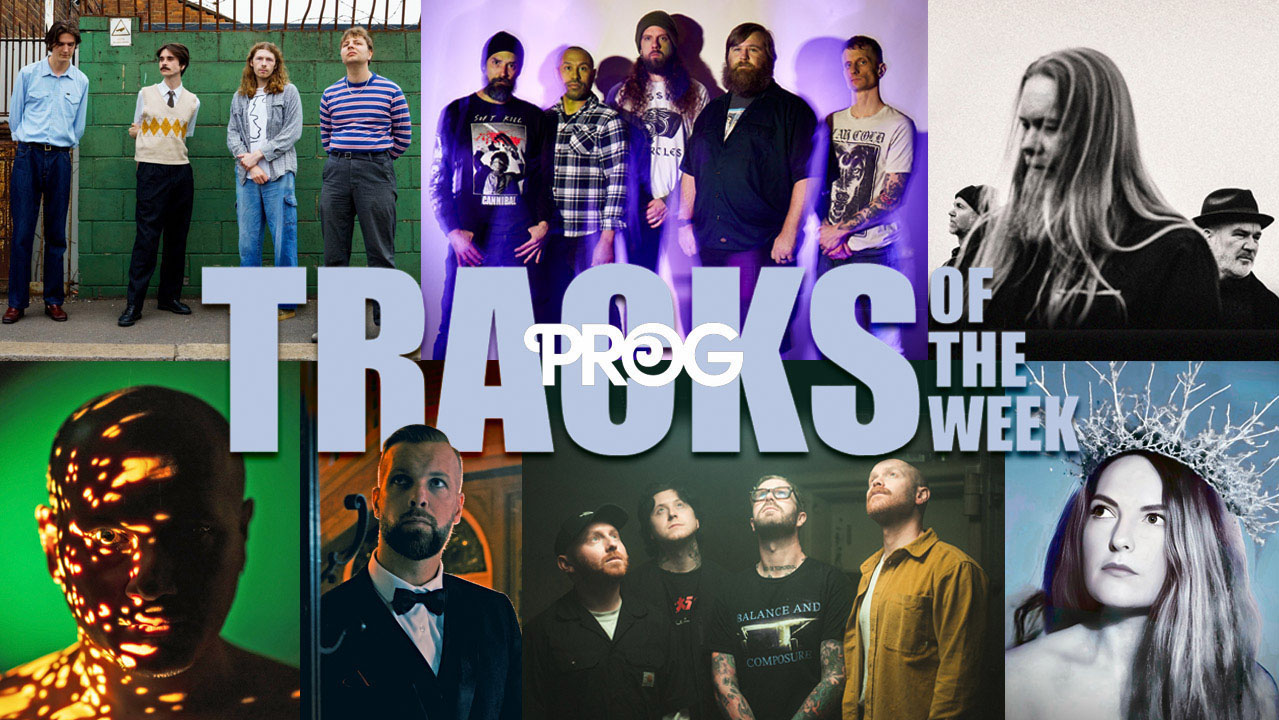Is Opeth's Mikael Akerfeldt the future of prog?
Mikael Åkerfeldt has spent nearly 30 years steering the ship of Opeth, a group that have progressed far beyond their metal beginnings. Could he be the new figurehead for modern prog rock?
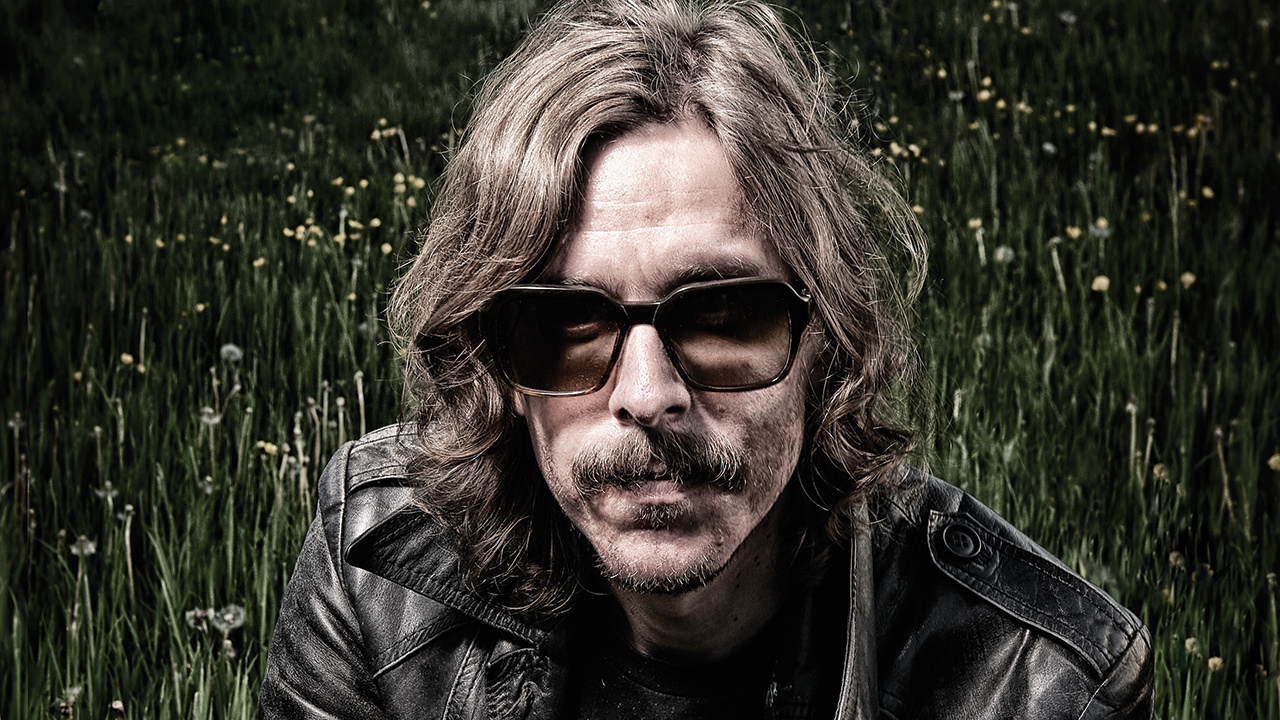
Mikael Åkerfeldt can’t remember precisely where he was when a disgruntled crowd member challenged him to a duel, but it was – inevitably – somewhere in America. Åkerfeldt’s band Opeth were on a US club tour in support of their 2011 album Heritage, a record that jettisoned the last vestiges of their guttural extreme metal sound in favour of music that was pastoral, contemplative and unequivocally progressive.
The album had barely even hit the shelves, but Åkerfeldt decided that he was going to “force-feed” the new songs to the crowd, acoustic passages and all. Not surprisingly, this new Bob Dylan-in-reverse direction didn’t go down too well with the knuckle-dragging element of their audience.
“We were hitting places where they were a bit loud in voicing in their opinions in the middle of the show,” he says. “People started complaining and screaming and leaving during the show. And people started to challenge me to fights onstage. At this one show, this guy threw down his glove. He was challenging me to a duel.”
Did you take him up on it?
“No,” says Åkerfeldt with a laugh. “I had him thrown out.”
Such are the pitfalls of being a modern prog icon, especially one as single-minded as Mikael Åkerfeldt. The 43-year-old Swede has steered Opeth from their beginnings as part of the Scandinavian death metal scene to their current position as 21st-century progressive rock standard-bearers.
It hasn’t always been easy – there has been resistance from outside and inside the band. Ask Åkerfeldt today how he’s managed it and he puts it down to his innate doggedness.
Sign up below to get the latest from Prog, plus exclusive special offers, direct to your inbox!
“I’m a stubborn person,” he says. “Like playing Heritage songs before the album even came out, that was just tunnel vision: ‘We’re gonna do it this way, and you can fuck off if you don’t like it.’ Sometimes I’m too stubborn, maybe. But I can’t change myself.”
It’s an approach that has served Opeth well, even if it has occasionally brought the band – and Åkerfeldt himself – close to the edge. Today, talking from his home in Sweden ahead of a short European tour to support last year’s stellar Sorceress album, he’s on garrulous form: friendly, open, honest and funny about his past, present and future.
Åkerfeldt, together with Steven Wilson, Devin Townsend, Ihsahn, Enslaved and more, is one of prog’s New Kings – a group of musicians who, individually and collectively, have taken the foundations of the genre that were laid down 50 years ago and built on them, looking forward rather than backwards.
“I’ve put a lot into Opeth over the years,” he says. “But then I’ve had no choice. This band is our life’s work.”
In some ways, Mikael Åkerfeldt makes an unlikely progressive rock hero, but in other ways it was the only possible path he would eventually take. As a teenager, he was a dyed-in-the-wool heavy metal fan, albeit one with an eye on the past: he loved Judas Priest and Deep Purple as much as the thrash and death metal that was in vogue at the time. “I always thought I was born in the wrong era,” he says. “I never felt like I fitted in. I should have been around in the 70s.”
While all his school friends focused on getting grown-up jobs – “They wanted to be civil engineers or some bullshit” – Åkerfeldt dreamed of doing something else. “I didn’t want to be forced into a society where you have to be a certain way, where anything else you want to do is just a futile dream,” he says. “I just wanted to be a guitar player. That was gonna be my job.”
He dropped out of school early, at 17. His parents weren’t hugely supportive of his musical dreams. “They said things like, ‘You should get a proper job, get a proper education, and you can have your hobby on the side.’ They used that word a lot – ‘hobby’. It made me fucking furious. ‘What do you mean, ‘hobby’? It’s my life.’”
Sweden in the late 80s and early 90s was the ground zero of extreme metal, and Åkerfeldt found himself in the thick of things. Opeth weren’t his band – he had been recruited to play bass by original vocalist David Isberg, to the chagrin of the other members at the time. They all promptly left, leaving Isberg and Åkerfeldt to rebuild the group. Isberg himself bailed within a year, handing the reins to Åkerfeldt.
Early Opeth albums such as Orchid and Morningrise fell squarely in the extreme metal arena, though they possessed a musical ambition that most of their peers lacked: songs such as the 20-minute Black Rose Immortal and the dreamily bucolic Credence showed a progressive soul fighting to break out.
When you look back at those early albums, do you recognise the band that made them?
A little bit, yeah. I recognise the idea of the band, but I was limited as a guitar player and a songwriter. I’m very proud of those early records, but there’s one thing I hear, which is a hunger, that makes me cringe. It’s kind of a juvenile hunger.
Isn’t that a mark of your ambition? That can’t be a bad thing!
It’s not a bad thing. It just makes me cringe. I had an ego. I figured we were the best band around. It was important in those days because it was the only fucking good thing I’d ever done in my life. Now I’ve been in the game for a long time, I guess I’m a bit more jaded [laughs]. I’m not less ambitious – it just shows in different ways.
Was Opeth a democracy or were you the leader from early on?
I always wanted a clean democracy – five people in the band, everybody as equals. I wanted it to be a tight unit of friends – that was more important to me than flexing my muscles, like, “I’m the fucking songwriter here.” Even though I did write most of the songs, there was a more democratic feeling, even if on paper it wasn’t really a democracy. [Laughs] It was a dictatorship like it is today.
You’re the only constant member throughout Opeth’s entire career. Why have you got through so many musicians?
It’s not a Ritchie Blackmore thing. In the early days, we didn’t make any money, we couldn’t live off the music, so a lot of people simply quit. Other people have been fired, but I haven’t fired anyone based on nothing – there’s always been a reason. I want to have a family-type situation, but it hasn’t always worked out like that. The people who are not in the band any more, they’re the ones who have the problems as far as I’m concerned.
Are you a difficult person to work with? A hard taskmaster?
I wouldn’t say I’m hard to work with. But I think I am a hard taskmaster. I don’t give up easily. I’m not the best musician in the band. All the other guys are fucking terrific – I’m not at their level. I’m a pretty mediocre guitar player and singer, but I do write the songs, which is my strength. I have a clear idea of what Opeth is supposed to sound like, and we have something that’s ours. But musically, I would have fired myself a long time ago.
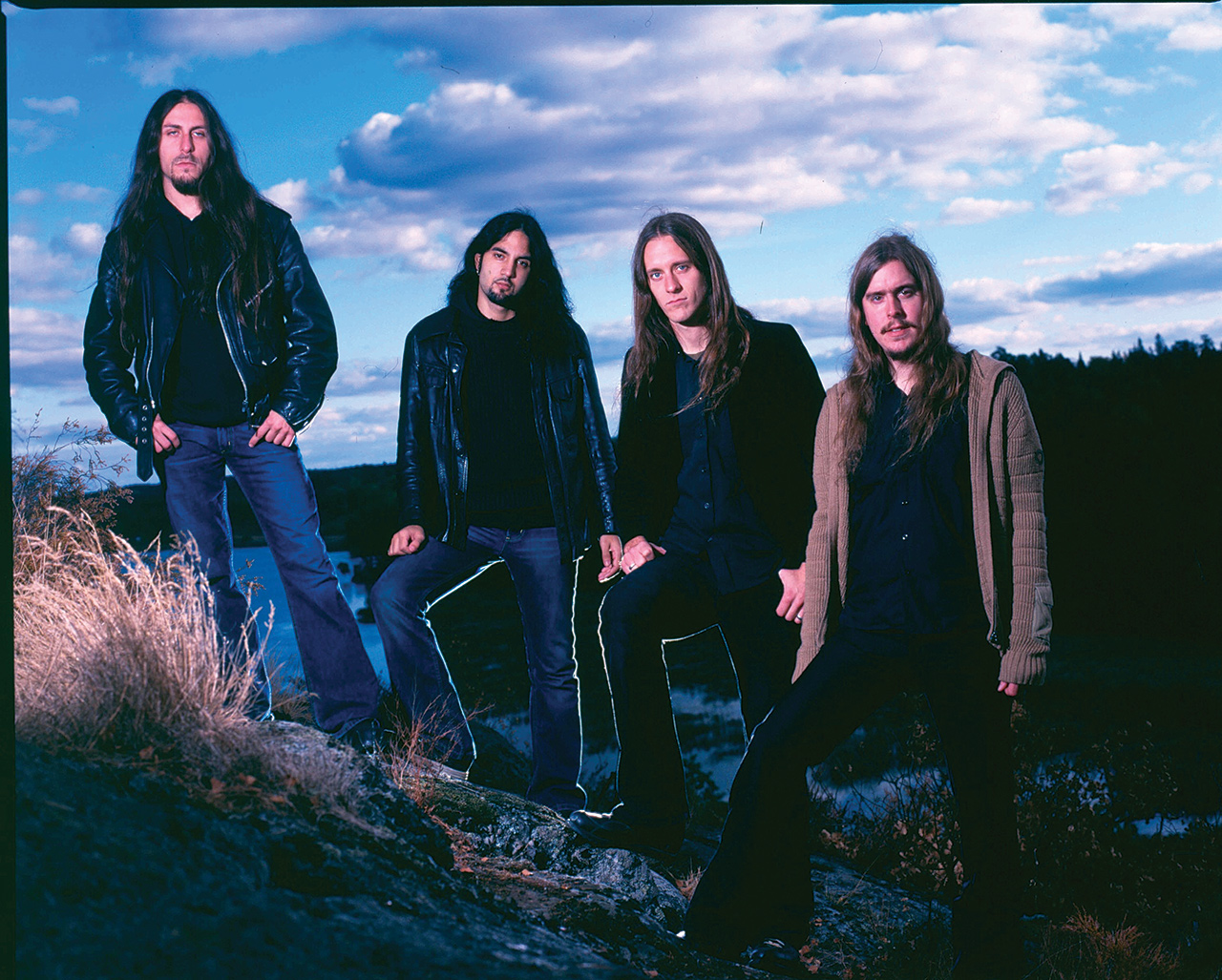
At the end of the 00s, Mikael Åkerfeldt had a crisis of confidence. Opeth’s most recent albums, the increasingly intricate Ghost Reveries (2005) and Watershed (2008), had been garlanded with praise and continued the band’s upwards trajectory. When Åkerfeldt started writing a follow-up to Watershed, he knew it wasn’t right.
“I wrote a continuation of the Watershed record, which was good but not great,” he says. “I was telling myself, ‘It’s good enough,’ which had always been forbidden. Things should never be ‘good enough’.”
It was bassist Martín Mendez who helped set Åkerfeldt right. Mendez told his bandmate what he’d written was “shit”. “That was helpful,” says Åkerfeldt dryly.
In reality it was. On the advice of his bandmate – and of producer/friend Steven Wilson – he scrapped the new songs and started again from scratch. The album that came out of this period of artistic turbulence would arguably be the most controversial, but also the most pivotal, of their career: Heritage.
Like Blackwater Park a decade earlier, Heritage remains a key staging post in Opeth’s career. They’d made bold artistic statements before – not least the amped-up/stripped-down yin‑yang of Deliverance and Damnation (2002 and 2003 respectively) – but never anything so audacious.
Stripped of death growls, grinding riffs and anything else even remotely resembling extreme metal, Heritage was, perversely, more challenging than anything they’d released before. Åkerfeldt had been edging prog‑wards ever since he was introduced to Camel years earlier by a colleague while working at a music shop in Stockholm, but this was an all-or-nothing embrace of the genre. It wasn’t quite a rebirth for Opeth so much as their prog coming-of-age ceremony.
Heritage was a big turning point, but it also sounded like an album you’d been itching to make for years. Is that the case?
Absolutely.
So what took you so long?
I guess I was comfortable because we were popular with whatever we were doing up till then. All those records had done well for us, it was comfortable, we could pay the bills. But we needed to try something different. And our bass player telling me the songs I’d written were shit helped.
A lot of people had a fairly adverse reaction to it, like the guy who challenged you to a duel in America. But surely they should have seen it coming, right?
That’s what I thought! Some people got really, really upset with it, but I didn’t see it as a massive departure from before. If you couldn’t see that coming, I wondered where you’d fucking been.
Did the reaction hurt you?
Not really. I was in that tunnel vision mood: “We’re gonna do it this way.” I don’t regret it. It made us improve as musicians.
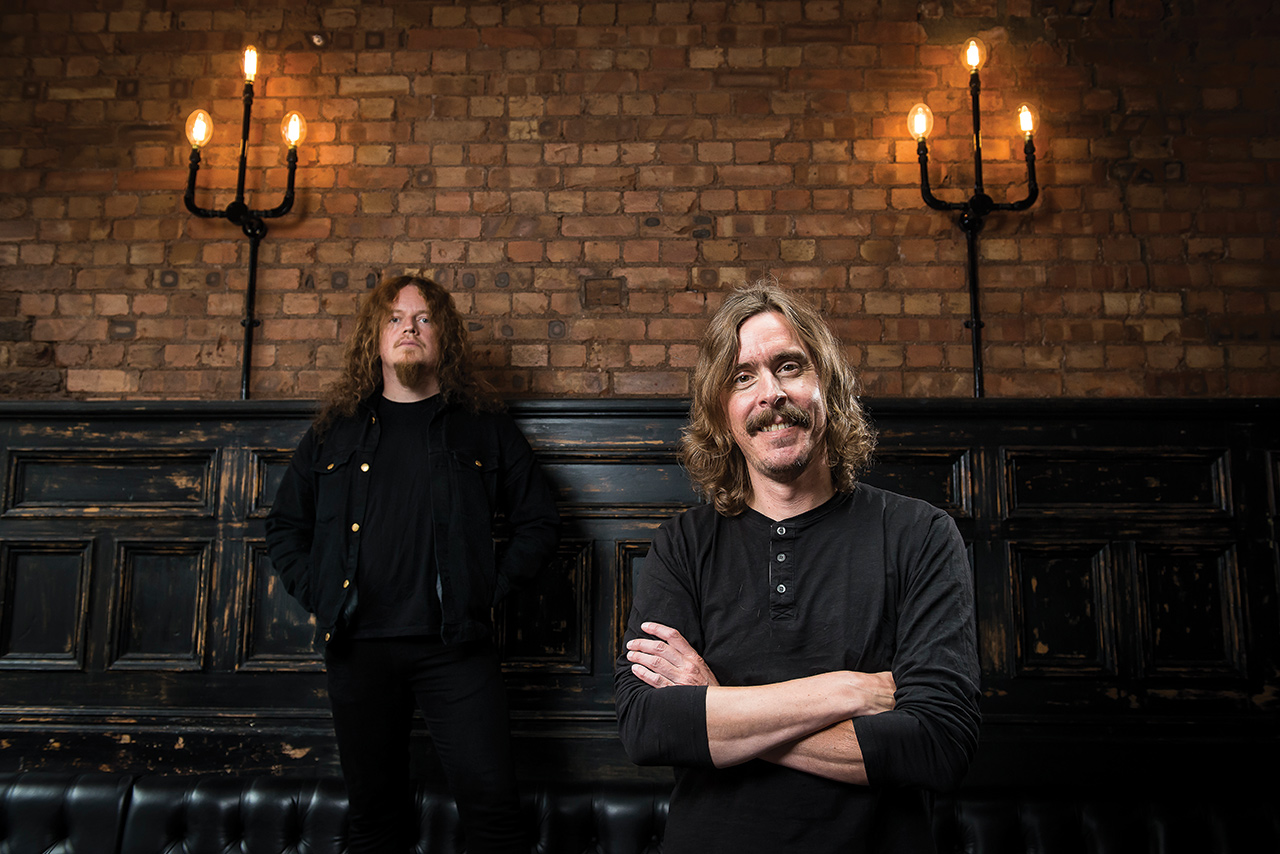
Åkerfeldt’s songwriting ability is almost matched by his gift for self‑deprecation. But his humour – and his mental wellbeing – has been sorely tested over the years. Ask him if there have been times when it hasn’t been fun being in Opeth and his reply is instant.
“Oh fuck yeah,” he says. “Millions of times. Being in Opeth has been shit at times. It’s been shit for a lot of the time, in fact. We’ve had so many problems in this band. We’ve just never gone public with them.”
The worst time came in the 00s. The band’s fourth album, 1999’s Still Life, was a watershed moment. Easing back further on the brutality in favour of a complex, intricate approach, it served notice to the wider world that there was more to the Swedes than anyone could have guessed just a few years earlier. Two years later, the follow-up, Blackwater Park, suggested that their progressive/extreme metal hybrid was more than just an accident (Blackwater Park remains the definitive Opeth album in the eyes of many).
But the artistic and commercial success coincided with a period of turbulence for both the band and Åkerfeldt. Issues with then-drummer Martin Lopez created internal tensions that gradually built over a period of years. As the de factor leader, Åkerfeldt bore the brunt of it. He began suffering debilitating anxiety attacks.
“It was all mental problems caused by the situation in the band and the fact I took on too much work,” he says. “There was a time when nobody in the band cared if we were gonna continue or not. I carried everything on my shoulders and the other guys didn’t give a flying fuck about anything as far as I was concerned. They just expected me to deliver the goods, and then collect the cash.”
Does it feel like you carry a heavy load leading Opeth?
Yeah, but there’s pros and cons of being a band leader. People listen to what I have to say, people respect what I have to say. If I have an idea, they’re open to trying it out. But there’s a lot of stress too. If we do something bad, it’s my fault.
What’s been the lowest point of your time in the band?
There’s been low points with all the ex-members, but in the early days when people left or got fired, it was like, “Okay, this didn’t work out because you’re going this way and we’re going that way.” But later on there were other problems – all sorts of fights, abuse of many different kinds. I don’t really want to talk about it cos we made a vow that we would never bring some of these things up. But it’s been a constant thing.
How bad did things get for you?
At one point I thought I was going to die, it was so bad. I thought panic attacks and that sort of thing was a fucking crock of mumbo jumbo shit. I thought, “That’s never gonna happen to me.” But I got so ill that I was physically sick. I had to go to the doctor. I went to therapy and started reading up on panic attacks. I started to learn more about mental health, and that it could affect you physically too. Once I knew that, it was easier for me to strike back against those symptoms.
You got divorced a few years ago. That couldn’t have helped?
No, it didn’t. First we had the problems in the band, then I got divorced. It was quite a few years when I wasn’t feeling that well. I had so many personal problems, it was bound to find its way into the music. More so the lyrics, actually. I had to re-evaluate my life. The Heritage album was when I started to do that.
How long did all these troubles last?
I’d say the start of everything band‑related was 2002, and it ended in maybe 2014. That’s a long time!
Would you say there are still problems in Opeth today?
Of course. There are problems in any band. But they pale in comparison to the shit that was happening around the millennium.
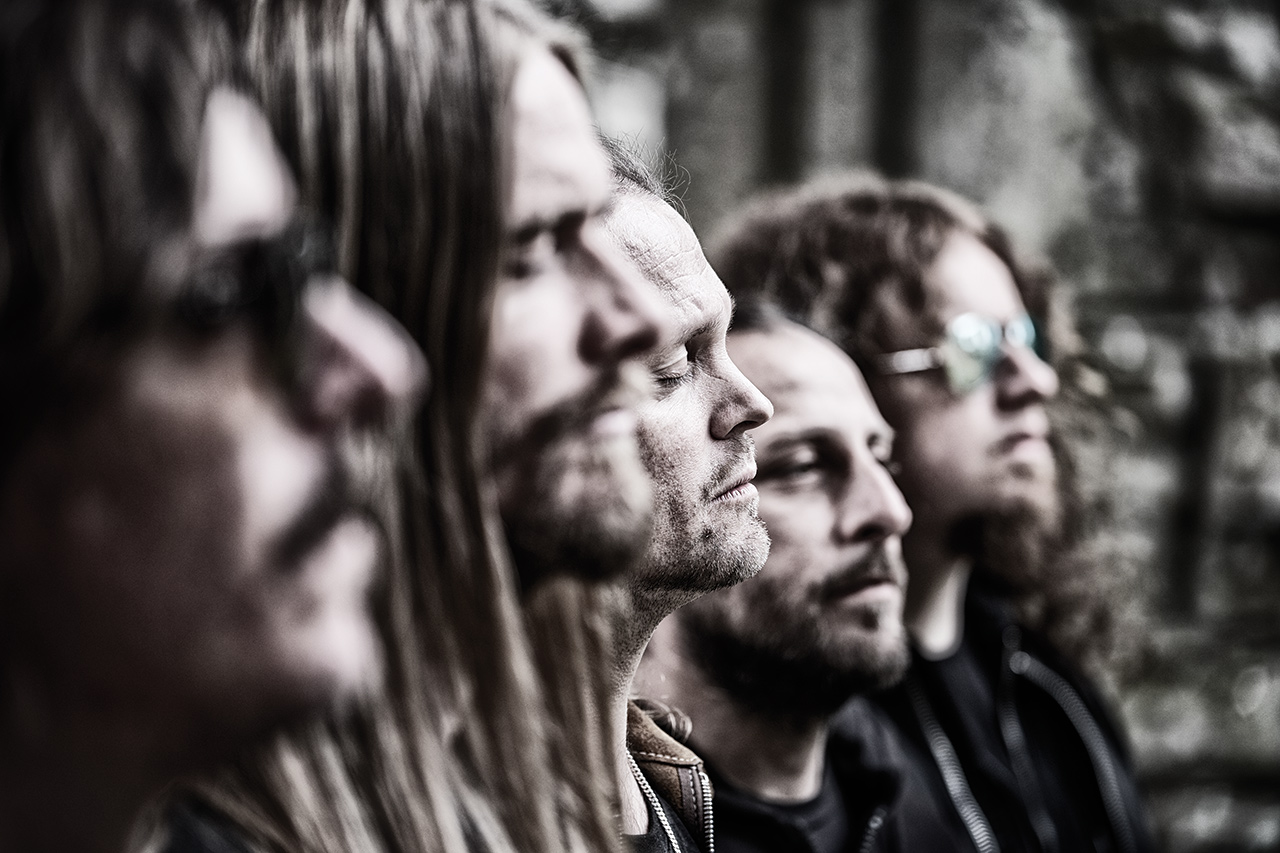
That’s not to say there aren’t positives that come with life in Opeth. The band have taken him to places he wouldn’t have otherwise gone to, and introduced him to people he wouldn’t have otherwise met. Like soft jazz saxophone legend Kenny G.
“His kid is a big fan of death metal, and Kenny comes to the show with him,” says Åkerfeldt. “I was talking to Kenny after the show, and he was going, ‘How can you scream like that?’”
And then there’s Jada Pinkett Smith, actress and wife of Will ‘Fresh Prince Of Bel Air’ Smith.
“She’s a fan, and when we played in LA she came in the dressing room with her entourage. It was just me in there. Fredrik [Åkesson, guitarist] was in the shower – he didn’t know she was there and he was farting very loudly. She didn’t say much. She just stood there listening to these farts echoing around this tiled shower.”
But Mikael Åkerfeldt’s best celebrity story involves one of his home country’s most famous people: Agnetha Fältskog. Åkerfeldt met the reclusive former ABBA singer as they finished recording Heritage in the same studio the Swedish pop icons recorded their original albums.
“The owners of the studio invited us to dinner at their place because they liked us so much,” says Åkerfeldt. “And they go, ‘Oh, we just invited a friend of ours.’ And it was Agnetha. I’m like, ‘Of course I recognise her!’”
Åkerfeldt admits that he was star‑struck. “I started drinking heavily because I’m so shy. Once I was drunk, I was like, ‘Okay, I’m sorry but I have to talk to you about ABBA.’ And she was happy to answer all my questions about obscure songs.”
At some point in the night, someone put on a jukebox. “I invited her to dance,” he says. “I was dancing with the Dancing Queen. Sadly it wasn’t to Dancing Queen.”
You said you were shy that night. Are you generally shy?
I am in some ways. Especially when I’m being exposed to my idols. I’ve been to the Prog Awards or the Grammys and there’ll be someone there: “It’s fucking Ian Anderson!” or whoever. It’s weird, cos I was never really like that when I was younger. I was just too shy.
Back in the day, Judas Priest were in Sweden for the Ram It Down record, and I spent night outside the Sheraton hotel like a fucking groupie, waiting to get my copy of Rocka Rolla signed. It made my life. But apart from that, I never really waited around. Now I’m one of those guys that people wait around for, I know what a hassle it can be.
Do you like the attention that comes with being a frontman?
Yeah, I think I do, probably more than I’d admit. I complain that I don’t get much privacy, but it’s a little bit hypocritical. If it ended, I’d be like, “What the fuck happened! Please like me!” I probably have a little bit of an attention whore thing going on.
Opeth have never gone down the clichéd ‘sex, drugs and rock’n’roll route’, though.
Well, I like to think we have the rock’n’roll sometimes. There’s been some sex along the way but it’s mostly alone in your hotel room. I’ve never tried drugs myself, but there have been drugs. But we don’t go around flaunting the bad side of things. We don’t think it’s cool if someone took a line of cocaine back in the day. I think that’s fucking sad if you ask me. I do like to drink stupid amounts of wine though.
Mental breakdowns aside, what don’t you like about being in a band?
I don’t like touring. I like the playing, of course, but I hate travelling, I hate airports, not having privacy in a tour bus. It’s just the same old fucking shit every day and it’s boring. We played 270-odd shows for Heritage. That’s too much. We’re going to be around a hundred for Sorceress. That’s still too much. But that’s just me.
So what’s the optimum number of tour dates for you?
Before I go on tour, it’s zero shows. But once I’m out there, it’s fine. I love the shows themselves, they’re great. I love being in different countries, going record shopping. But it’s just seeing this being planned in front of your eyes. Three weeks turns into five weeks which turns into three months.
Have you ever thought of retiring from touring?
Yeah, I have, of course. But there’s an organisation behind this. There are people who depend on us touring because it’s the bread and butter. And I’d probably miss it if we didn’t tour – I’d probably feel that something’s not right. My ego needs that fix.
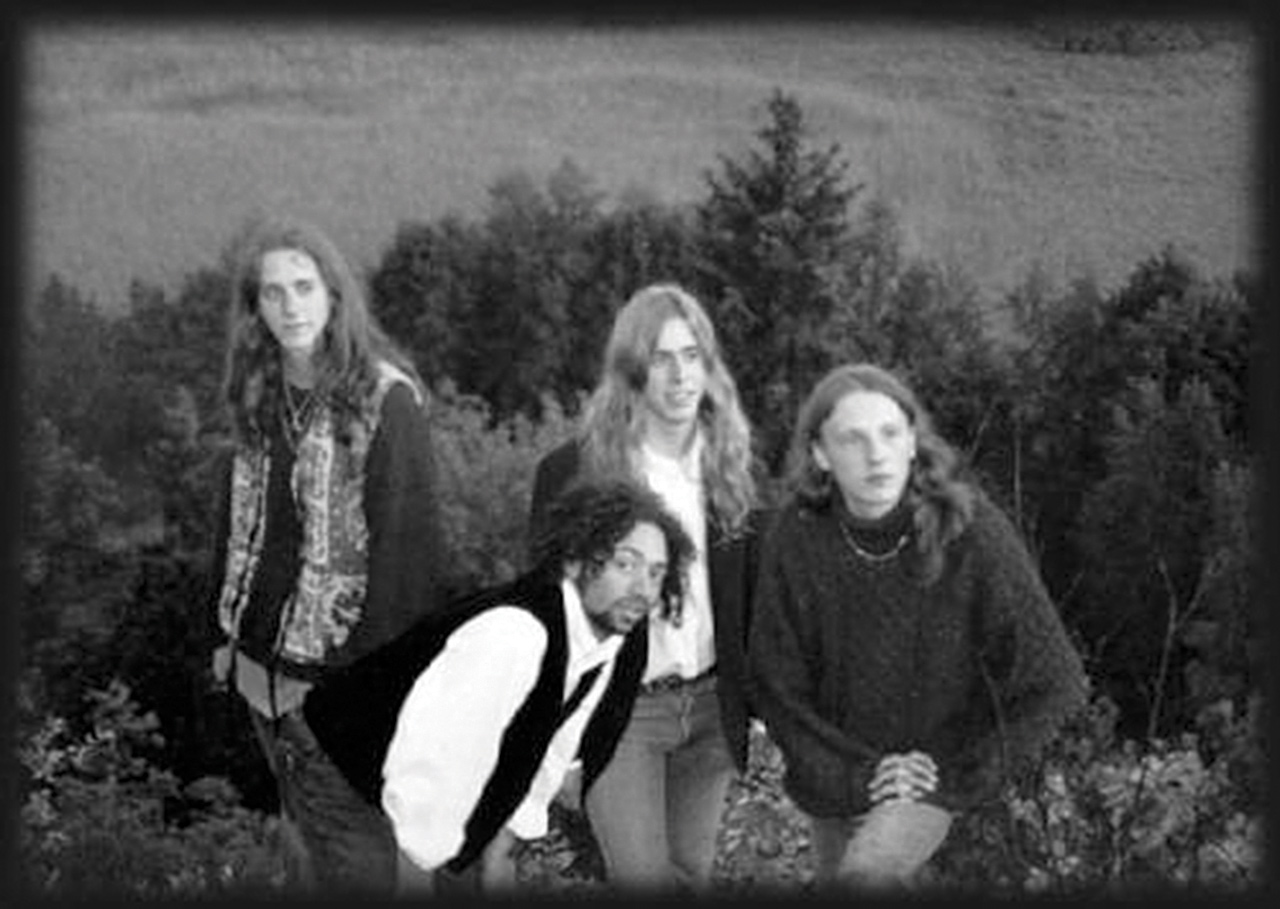
If Heritage alienated a chunk of their original fan base, it didn’t mean the band were wholeheartedly embraced by the prog world either. To the more recalcitrant sections of the community, they were still a metal band, one who could slip back into the bad old ways at any point. It was an outlook that missed the point entirely, given that the very nature of progressive rock involves challenging yourself and moving forward at every step.
The two albums that Opeth have released since Heritage, 2014’s Pale Communion and 2016’s Sorceress, have gone a long way to banishing any lingering suspicions. Åkerfeldt even received the seal of approval from Steve Hackett when he was invited to appear on the guitarist’s Genesis Revisited II album, singing sections of Supper’s Ready.
Who do you judge yourself against – your peers today or older bands?
I don’t really feel in competition with anyone. Not because I think that no one can compete with us, it’s more a case of I don’t want to compete with other people. I don’t sit around going, “This is better than Octopus by Gentle Giant.” I’m not thinking in those terms.
What about Steven Wilson? There’s some competition there, right?
Ha! I do get a little bit jealous of Steven sometimes. When he writes a great song, I’m like, “Fuck you, you fucking asshole. I’m going to show you.” But he’s told me a couple of times, “I’m jealous of that song, I wish I’d written it.” There’s competition, but it’s healthy and inspirational. It’s loving competition.
There isn’t a Progressive Rock Hall Of Fame, but if there was, would you put Opeth in there?
Shit yes. We’d be in there. But there’d be shitload of bands that would be inducted prior to us. I wouldn’t want to go in first or second. Maybe around 215th, when there’s no other good bands left.
Do you see Opeth as one of the great prog rock bands?
No, that’s a different type of thing. I love our music, of course I do. I have to, because I write it. But one of the great bands? It’d feel very uncomfortable saying that.
Is that just false modesty?
No, it’s proper modesty. I’m Swedish. We’re indoctrinated to be modest over here.
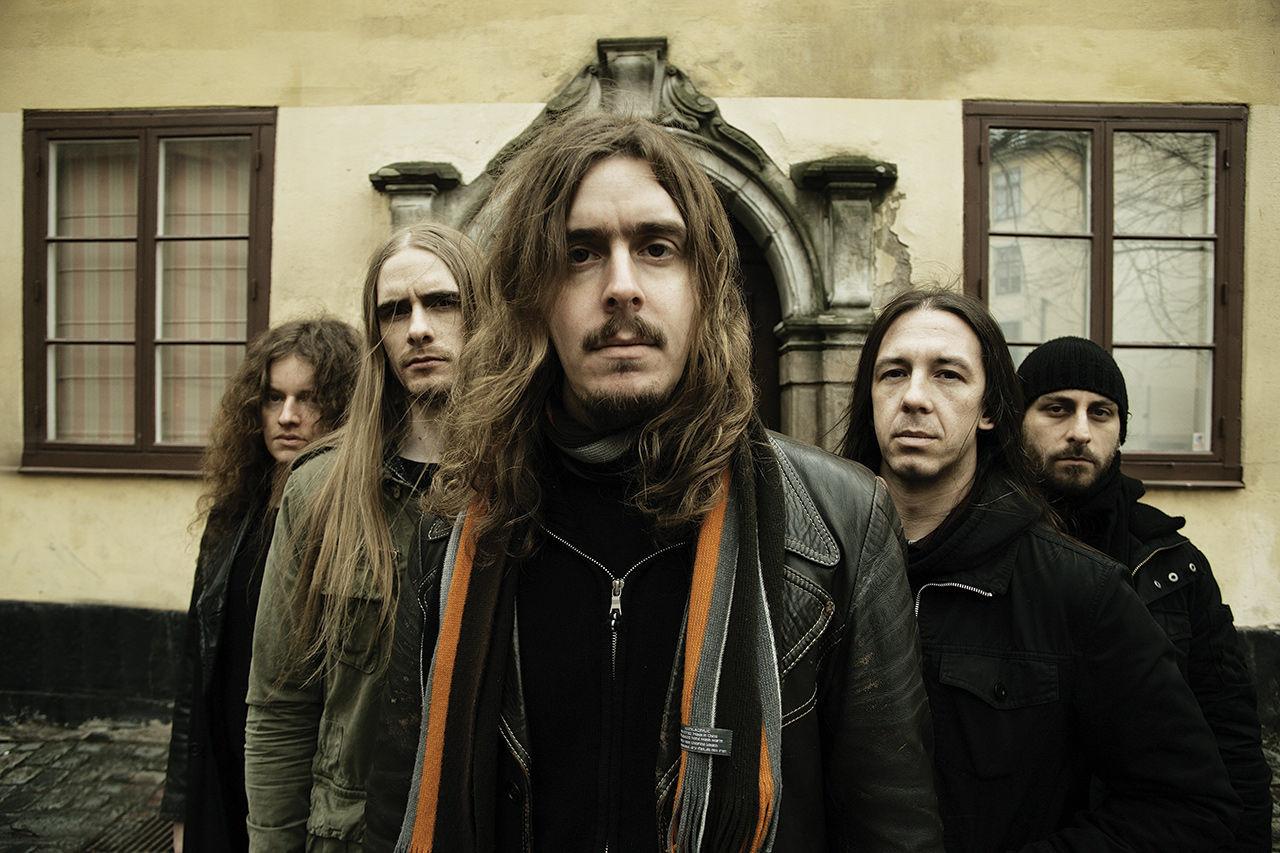
The unwanted hassle of touring aside, Mikael Åkerfeldt says he’s happier than he has been in a long time. “I’m in a fantastic relationship, I’ve just moved into a new place, my children and me have a great relationship, my relationship with my ex-wife is good, my band is doing well, I have my health. So yeah, I’d say I’m fucking happy.”
What’s next for Åkerfeldt is still TBC. The possibilities, if not endless, are certainly wide-ranging: a new Opeth album, perhaps? A second album from Storm Corrosion, his project with Steven Wilson? A collaboration with a kindred spirit such as Devin Townsend or Mike Portnoy, both musicians he’s been speculatively linked with in the past? Maybe even a solo album?
“I’d love to do all of the above,” he says. “But in the real world, I’ll probably have to muster up the energy to write an Opeth record. I did start writing some stuff the other day actually. Some ideas I was working on. They’re kind of shit to be honest with you. They’re probably not gonna last.
Where will a new album take Opeth?
I hope it’s going to be outrageous. I want to push myself. I want to write music that doesn’t sound like I wrote it. That’s my dream. [Laughs] But the stuff I’ve written so far just sounds like generic shit.
What is it that makes Opeth’s music connect with people?
That’s a difficult question. I don’t sit around breaking down songs. I don’t have illusions of grandeur that our records are going to break us on a huge scale around the world – it’s not, “Guys, you better check the prices of Jaguars and Rolls Royce’s cos you’re going to be able to buy one in a couple of months.”
It’s hard to talk about our music without sounding like I’m being cocky. I guess its big, it’s pretentious, but it’s honest music. I don’t have many ideas with the band other than to come up with good music – music that we like. I just want to keep it honest, and I want to love it when it’s done.
That Swedish modesty strikes once again. Nearly 30 years after they first started in the dank corners of the Swedish heavy metal scene, Opeth have repositioned themselves in the vanguard of contemporary prog in a way that no one could have foreseen all that time ago. Åkerfeldt himself has become a figurehead for the scene, albeit a reluctant one. Progressive rock’s future is safe in his hands. Assuming no one shoots him in a duel first, that is.
Sorceress is out now via Moderbolaget/Nuclear Blast. Opeth are currently on tour. See www.opeth.com for more information.
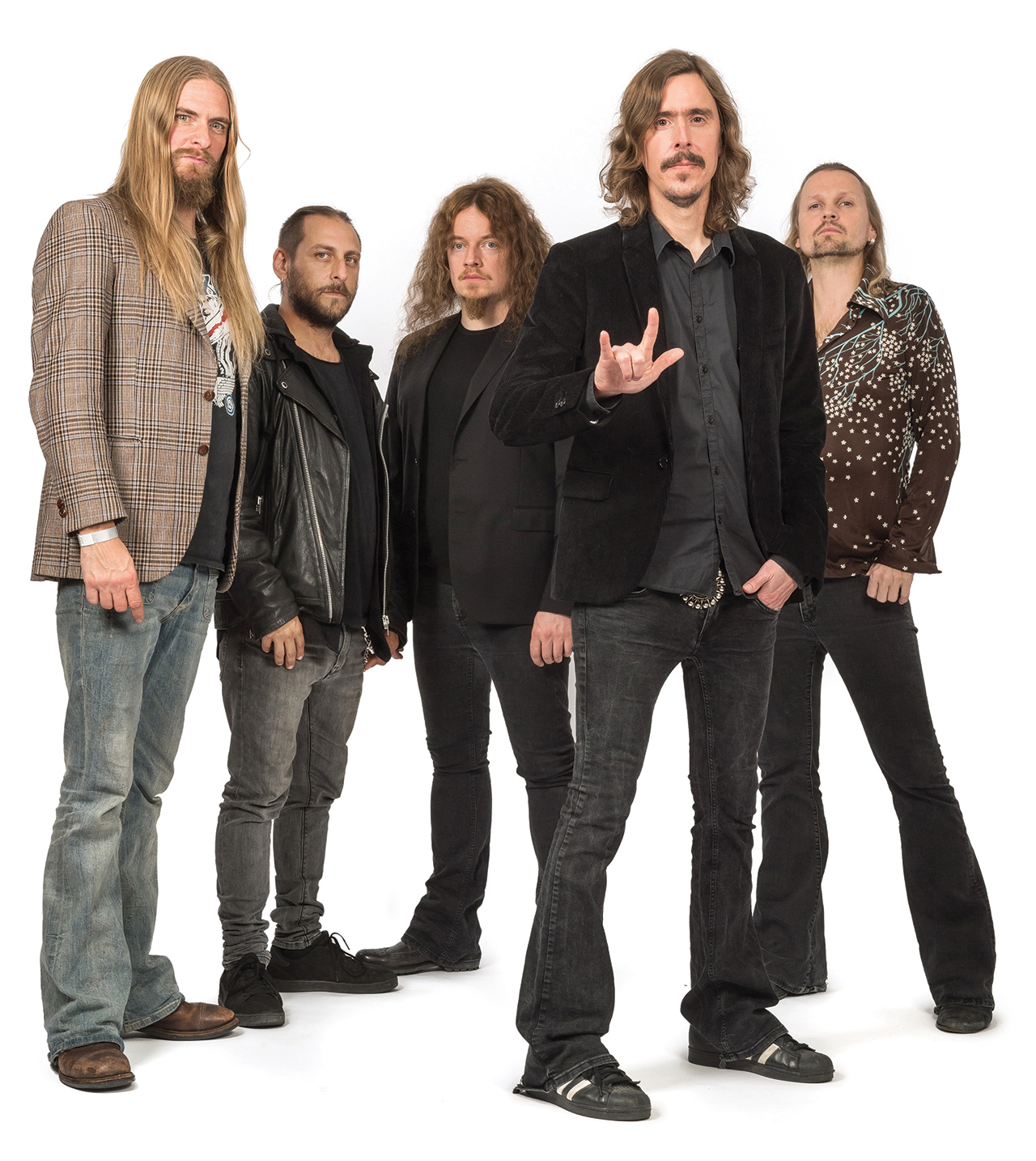
The 10 records that changed Opeth frontman Mikael Akerfeldt's life
Dave Everley has been writing about and occasionally humming along to music since the early 90s. During that time, he has been Deputy Editor on Kerrang! and Classic Rock, Associate Editor on Q magazine and staff writer/tea boy on Raw, not necessarily in that order. He has written for Metal Hammer, Louder, Prog, the Observer, Select, Mojo, the Evening Standard and the totally legendary Ultrakill. He is still waiting for Billy Gibbons to send him a bottle of hot sauce he was promised several years ago.

